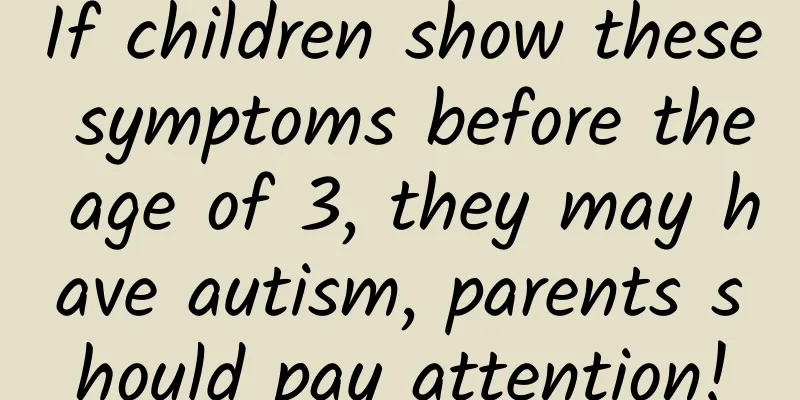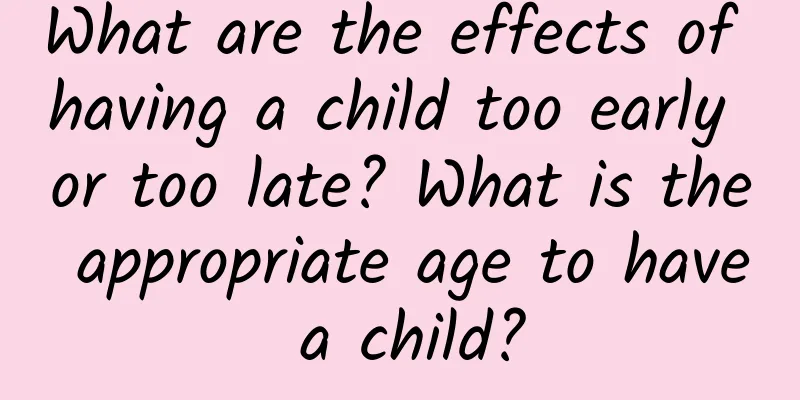If children show these symptoms before the age of 3, they may have autism, parents should pay attention!

|
April 2nd of each year is World Autism Day. Autism, also known as autism spectrum disorder or autism spectrum disorder, is a neurodevelopmental disorder with an increasing incidence rate, which places a heavy burden on families and society. Today is the 17th World Autism Day. We invited Liu Songhuai, Director of the Department of Psychology at the China Rehabilitation Research Center, and Zhang Yan, Director of the Department of Children's Rehabilitation at the China Rehabilitation Research Center, to answer some common questions about autism. 1. What is autism? Autism is a disorder of social communication and social interaction caused by the combined effects of environmental, biological and genetic factors, resulting in congenital abnormal brain development. The latest version of the American Diagnostic and Statistical Manual of Mental Disorders, Fifth Edition, has attributed the core symptoms of autism to persistently showing defects in social communication and social interaction and limited, repetitive behaviors, interests or activities in multiple environments. (On April 1, 2015, an autistic child plays alone at the Xinyikang Autism Rehabilitation Center in Yaohai District, Hefei. Photo by Xinhua News Agency reporter Guo Chen) 1. What is the cause of autism? At present, the cause of autism is not clear. Through years of research, it is believed that autism is a congenital developmental disorder caused by polygenic inheritance. Therefore, **autism is a gene-related disease, **environmental factors may cause problems in gene expression to a certain extent. But it should be noted that environmental factors are not the direct cause of autism. (On April 2, 2018, the "Star Children" from the Tianjin Disabled Rehabilitation Service Guidance Center were invited to the Tianjin Youth Activity Center for interaction. Xinhua News Agency (Photo by Shen Hua)) Some people may have questions: Is it possible that, for example, someone is born with an autism gene but has never developed the disease, but only develops the disease when I am 20 or 40 years old? In fact, this assumption is impossible. Autism will definitely show related symptoms in early childhood. If a well-developed normal person shows some autism-like symptoms at the age of 20 or 40, it is necessary to consider other causes of brain disease. 2. Why are people with autism also called “star children”? It is common to see some people calling autistic children "star children". This is a common name for autistic children because autistic people have unique lifestyles, behaviors and ways of communicating, which are all related to their unique way of thinking. Autistic children give people the feeling that they are very far away from ordinary people, just like the stars in the sky, so they are also called star children. (On April 1, 2017, an autistic child painted on a scroll. Photo by Xinhua News Agency reporter Wan Xiang) 2. What are the early manifestations and clinical symptoms of autism? The core manifestation of autism is communication disorder, which must appear in early childhood and will not appear until the teens, twenties or thirties. Since autism is caused by congenital abnormalities in brain development, if you observe carefully, you can even find autistic symptoms a few months after the child is born. Autism must appear in many occasions and situations. Autistic children will show autistic symptoms at home, kindergarten, and school. They will not behave well in school but be autistic at home. Therefore, if autism symptoms appear early and there are some fixed manifestations in many occasions, autism can be diagnosed. 1. Typical clinical symptoms of autism Typical autism mainly manifests in two parts, namely social disorders and stereotyped behaviors. Social disorders include social communication disorders and social interaction disorders. (1) Deficits in social communication and social interaction Common social communication disorders are mainly manifested as: no interactive language, ignoring parents' calls, not listening to instructions, not talking to others, etc. Moreover, autistic children do not understand other people's emotions. They express happiness and anger in a different way from ordinary people, and do not understand such emotions of ordinary people. As they grow older, children with autism will show social interaction disorders, such as difficulty in maintaining or creating social relationships and failure to establish stable friendships or social relationships with other children of the same age. (During the break, Zhou Min communicates with an autistic child who is not doing well (Photo taken on May 15, 2012). Photo by Xinhua News Agency reporter Liu Junxi) **Rarely making eye contact with others is a key feature of autism. **They avoid looking other people in the eye and may also withdraw from society. (2) Restricted, repetitive behaviors, interests, or activities Children with autism also have repetitive, limited interests and some stereotyped behaviors. For example, some children like to play with spinning things, and only spin the wheels when playing with cars. Others like to watch the toilet flush, usually staring at it for a long time, and like repetitive, stereotyped visual stimulation. Children with autism also have some typical stereotyped thinking. For example, some children have a fixed schedule for what to do at what time every day. If this schedule is broken, children with autism will have a complete emotional breakdown. Therefore, this kind of social disorder and stereotyped behavior are typical manifestations of autism. 2. These behaviors of children may be early manifestations of autism As mentioned above, autism symptoms can appear in infancy. So, how should parents judge whether their children's behavior is an early symptom of autism? Generally, autistic children under 1 year old will show related symptoms, but these early symptoms are easily ignored by parents. Most of the autistic children who seek medical treatment are discovered around 3 years old. Less serious autism is usually discovered after the child goes to kindergarten, and is often discovered because the child is different from other children. If a child cannot be amused at around 4 months old, cannot express excitement or happiness at around 6 months old, does not speak at 1 year old, does not respond to name calls, or still cannot use fingers to express his/her wishes at around 16 months old, then you may be autistic. Some experts summarize the early manifestations of autism as: not looking, not responding, not pointing, not speaking, and being different. These early manifestations of autistic children have nothing to do with parental education or guidance and are mainly caused by congenital brain development disorders. 3. Does autism have other accompanying symptoms? In addition to the above symptoms, many parents are also worried about whether autism will have other accompanying symptoms, such as developmental disorders or language disorders. **Language development disorder is an important manifestation of autism patients and one of the core disorders of autism. **Patients will show late speech or regression of language function. In addition, some patients will have stereotyped language, often repeating other people's questions or repeating a certain sentence. Patients can speak, but it is not a communicative language, and they mainly talk to themselves. It is not common for autism to cause physical retardation in children. Some patients may have physical development problems due to partial or picky eating. However, such physical development problems are not directly caused by autism. Some autistic patients may also have problems such as ADHD and mental retardation. However, it should be noted that ADHD patients are not necessarily autistic. (On May 12, 2011, Teacher Jin was giving a training to a child. During the 30-minute class, the child did not say a word to the toy. Photo by Xinhua News Agency reporter Xu Yu) 3. Parents must pay attention to these abnormal symptoms of children The most important manifestation of autism in children is social communication disorders and other stereotyped behaviors. Other accompanying symptoms are not used as a basis for the diagnosis of autism. Therefore, parents should not assume that their children have autism just because they have ADHD or picky eating. If a child exhibits behaviors such as " not looking, not pointing, not saying different ", this is a symptom that parents need to be alert to. It should be noted that insufficient parental care may aggravate the symptoms of autism, but will not cause autism. 4. How to deal with autistic patients who have emotional breakdowns? The emotional disorders of autistic patients are often caused by poor communication with others. Therefore, the older the autistic patients are, the more serious their emotional disorders will be. Because they cannot communicate with the outside world, autistic patients are also very painful, so they will have some bad behaviors. Patients will stabilize their emotions by aggravating stereotyped behaviors. Some patients will also have aggressive behaviors, such as self-harm and hurting others. (4-year-old Xiaoyu accidentally fell in the kindergarten, screaming and crying. Teacher Chen Qian knelt on the ground and grabbed her hand and said, "Don't be afraid, the teacher is here, I will help you clean it up." The child hugged the teacher and calmed down.) How should parents control autistic children who exhibit extreme behavior? When a child breaks down and engages in extreme behaviors such as hurting others or themselves, parents should first analyze the cause of the extreme behavior. It is generally not advisable to restrict children's behavior blindly or let them do whatever they want. During treatment, we will conduct behavioral analysis therapy, observe the causes of children's extreme behaviors and the consequences of abnormal behaviors, and improve children's abnormal behaviors by changing the causes and consequences. 5. Can autism be cured? This is the most concerning issue for every autistic parent. Unfortunately, autism cannot be clinically cured , and there is currently no specific treatment for the core symptoms of autism. **If autism is diagnosed, the patient's abnormal behavior and abnormal communication methods will last a lifetime. **Rehabilitation training can only be used to improve the communication skills of autistic patients and reduce abnormal behaviors. However, these trainings can only improve symptoms and cannot completely cure them. In fact, social communication is a human nature. For normal children, as long as there is an environment where they can interact with others, they will naturally learn social communication without training. Although, children with autism can also master some social communication skills and improve their social skills through training. However, it is impossible to completely correct abnormal thinking state (stereotyped thinking). This is why even if some autistic patients have been well trained, they will immediately show symptoms when they move to a new environment. This also shows to a certain extent that autism cannot be completely cured. 1. Are children with autism aware that they are different from other people? Some patients with higher abilities can realize the differences between themselves and others. Some autistic patients will write books to describe their thinking state, psychological state and behavior. Some autistic patients can master some social skills through learning, but find it difficult to use these social abilities fluently. Sometimes, even though they know their problems, they still cannot complete certain social behaviors. 2. Do people with autism need someone to accompany and take care of them throughout their lives? Can they live independently or start their own family? The prognosis of autistic patients is directly related to their intelligence level, social skills and the severity of their symptoms. Some children with autism can be completely independent. In clinical practice, it is often seen that some autistic patients can work, get married and have children. This also shows that autistic patients with milder symptoms can completely return to society. Some patients with more severe symptoms can achieve independence with the help of others in certain environments and with the assistance of others. Such autistic patients can take care of themselves or be self-reliant in certain environments, such as being a baker, barista, or specializing in computer software work. However, autistic patients with severe symptoms need to be cared for by their family or professional nursing institutions. Therefore, depending on the symptoms of autism and the severity of the symptoms, patients can have different outcomes. Targeted rehabilitation training is actually to enable more autistic patients to adapt to the social environment, better integrate into society, and live independently. 3. Is autism hereditary? Although there is no accurate calculation of the probability of autism genetic inheritance, it is certain that autism is closely related to genetic inheritance. Studies have found that about 25%-35% of autism patients are caused by genetic factors. There are also many clinical cases where parents have autism symptoms, especially fathers with autism, and the probability of passing it on to their children is higher. 4. Do people with autism have abilities that are different from those of ordinary people? We often see or hear that some autistic children do have some special abilities. Among them, there is a type of autism called Asperger's syndrome, which belongs to the autism spectrum disorder. Such children usually have some special abilities, such as spatial ability, image ability and memory, and some children are even labeled as "geniuses". However, many parents ignore the early symptoms of autism because of these "special abilities" of their children, thus missing the best time for early intervention of autism. (On April 2, 2018, visitors were viewing the paintings and derivative products of autistic students. Photo by Li Zhong, Xinhua News Agency) Autistic children are different from children with mental retardation. Their intelligence is generally normal. Children with intellectual retardation have a wide range of low abilities, but autistic children still have some special abilities in certain areas. 6. How to intervene and treat autism early? It is said that autism needs to be discovered, diagnosed and treated early, so what is the best time to treat autism? Theoretically, the earlier autism is discovered and treated, the better the child's recovery will be. In general, the principle of autism treatment is early detection, early diagnosis, and early treatment. If parents find that their children have social disorders or stereotyped behaviors, they must seek medical attention in time and do not take chances. Severe autistic patients usually show abnormal behavior a few weeks to a few months after birth, so they must seek professional medical evaluation and intervention treatment before the age of 2. Based on the basic abilities that children already have, using some behavioral methods to mobilize children and assist them in developing their abilities is also a way to treat autism. For moderate autistic children, if parents find problems before their children are 6 years old, early intervention is necessary. When parents think their children's behavior is abnormal, they should also seek professional evaluation and intervention guidance. What methods are used for intervention treatment of autism? At present, there are many intervention treatments for autism. Early intervention treatments will use some behavioral therapies. 1. Psychological intervention The intervention treatment of autism should be based on humanistic methods. Respect children and conduct behavioral extinction and reinforcement training according to their wishes. Use behavioral analysis methods and psychological behavior shaping to improve the symptoms of autistic patients. 2. Pay attention to family training Family therapy is crucial for autistic patients. Family therapy intervention is a model of psychotherapy. Parents are the first teachers of their children, and the healthy growth of autistic children cannot be separated from the words and deeds of their parents. With the help of professionals, it is important to first let family members accept and believe in themselves, reshape family roles, and let every family member participate in family therapy, which is crucial to the recovery of autistic patients. 3. Other treatments In addition, the National Autism Rehabilitation Research Center also has language training, music therapy, special education, and some traditional Chinese medicine massage methods. Targeting the child's specific problems and integrating the treatment methods into other treatments will also produce better results. (Zhou Min communicates with an autistic child in a personal training class (Photo taken on May 15, 2012). Photo by Xinhua News Agency reporter Liu Junxi) 7. Will delayed treatment of autism have an impact on children? Since most parents ignore the early symptoms of autism, many autistic children are discovered late. If parents cannot discover their children's abnormal behavior in time, this delay in treatment will indeed affect the children's language and communication abilities. Especially for autistic patients over 6 years old, they have formed a way of communicating in an autistic state, which will affect the difficulty and effect of training. If the child's abnormality is not discovered early and early intervention is not carried out, the abnormal symptoms of autistic children will become more and more serious, and some autistic patients will even have serious self-harm behaviors. 8. How do parents develop a rehabilitation plan? The rehabilitation plan for autistic patients is very important, but it is also difficult for parents to formulate a rehabilitation plan. Therefore, if parents want to formulate a practical rehabilitation plan for autistic patients, the most important thing is to cooperate with professional personnel to complete it. (On November 19, 2012, at the Jinan An'an Autism Rehabilitation Center, teachers are helping autistic children with rehabilitation training. Photo by Xinhua News Agency reporter Guo Xulei) 1. Identify your child’s specific problem It is necessary to clarify the specific problems of autistic patients, such as daily living ability, language ability, communication ability, emotional management ability, aggressive or self-harming behavior, stereotyped behavior, etc. Therefore, parents need to work with professionals to discover the specific problems of their children and the severity of the problems. 2. Listen to the opinions of professionals After a series of examinations, if the child’s specific problem can be identified, we will consider developing the child’s abilities based on the advice of professionals. 3. Synchronize with rehabilitation institutions Synchronize the rehabilitation training content of the child in the rehabilitation institution into family life. For example, eating is a good time to communicate with the child. When feeding, looking at the child and smiling at him/her is to integrate the training into life. In the process of training, we must pursue the principle of happiness and positivity. From a psychological perspective, how to help autistic patients recover? Since parents of autistic children are under more pressure, the first task of the psychology department is to provide psychological counseling and support to the parents of autistic children. As for the rehabilitation of autistic children, the rehabilitation work of the psychology department is mainly carried out in the following aspects: 1. Attention training, including pointing training, concentration training, joint attention or common attention training; 2. Conduct compliance training for patients by establishing behavioral rules; 3. Imitative training, such as imitation of language, actions, situations, etc.; 4. Behavioral therapy, which mainly develops the language and communication skills of autistic patients; 5. Conduct cognitive and intellectual rehabilitation training; 6. Behavioral training for daily living skills; 7. Conduct behavioral correction training for maladaptive behaviors. When correcting negative behaviors, it is important to first develop the child's correct language or behavioral communication skills. When the child has certain abilities, some negative behaviors may be reduced or disappear. 8. Guide parents to integrate the results of psychological and behavioral training in hospitals or institutions into their families. 9. How should we get along with children with autism? Learn to treat autistic children well For ordinary people, if we happen to meet children with autism in certain situations, how should we communicate with them so as not to cause these children's anxiety or emotional breakdown? In fact, autistic people are also part of our society. Although we don't know whether autistic people are suffering, we know that the parents of autistic people are very painful. As a society, we must understand, accept and tolerate such children, which is also the best help for them. Acceptance and tolerance means not forcing them to get along with others in the same way as ordinary people, and not rejecting them just because they are different from us: you greet him and he ignores you, or he doesn't even look at you when he talks, it doesn't mean that he is impolite or doesn't like you, it's just because he is like that; they just don't know how to express love, or can't feel love, but it doesn't mean that they don't have love. (On December 4, 2019, Chen Hongtao, a child with autism, found his own work at the exhibition with the help of his counselor.) These ordinary "strangers" are actually very abstract to autistic people. They often think that strangers can cause a lot of harm to them. While the general public accepts and tolerates autistic children, the most important thing is that parents should teach their children the correct way to deal with "strangers" : 1. Let children understand the degree of intimacy with people around them and the social distance they need to maintain; 2. Teach children what to do when facing strangers through animations, picture books and other methods that children can accept; 3. Set principles for your child to face “strangers” in advance. While paying attention to this disease, we should also learn to identify abnormal symptoms and improve our understanding of the disease. We should be aware of early detection, early diagnosis, and early treatment. **Every autistic child is like a star in the sky, very far away from us, but very beautiful. They come to our planet, full of fear. Therefore, we should guide and help them with warmth and love, so that they can enjoy the life they deserve. **Compared to changing them and making them adapt to society, it is more important that we should accept and tolerate them. |
<<: What are the common skin diseases in spring? How to use medication correctly?
>>: Brucellosis cannot be ignored
Recommend
Why is snail rice noodle delicious? Why is there no snail in snail rice noodle?
Snail rice noodle is the most famous and popular ...
The dangers of removing uterine fibroids
Uterine fibroids are a relatively common benign g...
How to correct breast asymmetry and what are the correction methods?
If the breasts are asymmetrical, I believe many f...
What are the benefits of eating fern root powder? What is fern root powder made of?
"Fern root powder" is a vermicelli food...
How to treat vaginal wall swelling?
The vagina is the most important organ in the fem...
How to prevent uterine prolapse
Uterine prolapse is a type of female gynecologica...
Complete treatment of cervical erosion
Because women's body structure is more compli...
Can I use breast enhancement cream while breastfeeding?
If breast enhancement cream makes breasts larger ...
Can I eat gluten during menstruation?
Menstruation is a critical period for female frie...
How to have an abortion when pregnant
Not all pregnancies are natural. Some people choo...
The incorrect medical knowledge in the movie misled many people, and some people were sent to the police station because of it.
Many people may find it difficult to understand b...
I got pregnant again in the same month of biochemical pregnancy.
Many women are very happy when they are pregnant ...
What functions does a smart TV have? How to connect a router to a smart TV
Smart TVs came along with the development of the ...
Is cupping good for girls to lose weight?
If the body is too fat, the probability of suffer...
How long does it take to get menstruation after abortion and what should you pay attention to?
With the development of society, the relationship...









